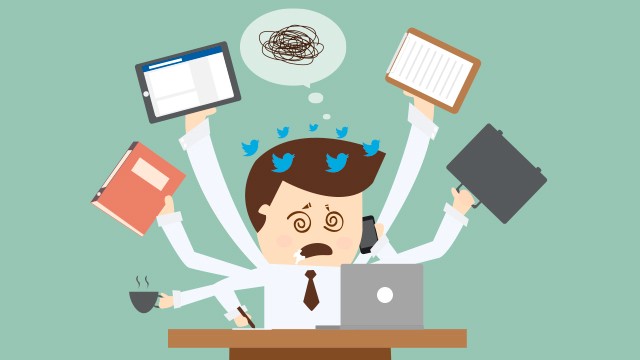How many clothes are in your hamper right now? Are you desperately trying to make sure that not a single dirty sock is sitting in there?
Unless you have OCD or are running low on underwear, you’re probably not too concerned about the clothes sitting unattended in your hamper — I’d have very little traction advocating a Hamper Zero program. When it comes to laundry, we intuitively understand that spending a lot of time making sure there are no unwashed clothes in our hampers would be counterproductive.
Yet many of us don’t make this translation when it comes to email. We forget that email is just a component of our work, and in many cases, there are far more important things for us to do than clear each and every email message out of our Inboxes. What we fail to factor in is…
Inbox Zero Gets Us in a Loop
Let’s take a second to think about some of those recalcitrant emails that manage to gum up our Inboxes and that actually require a response from us.
Some of those messages are of the simple research variety, in that to get rid of them, you need to click on a link and read something. While these seem easy enough on the face of it, the real issue comes not from the individual email itself but the fact that it starts you on the Loop. A link here takes you there, and there’s an interesting link there, so you post it on Twitter, and while you’re on Twitter, you start a conversation, and someone shares a link with you, so you check that out, and then someone DMs you or sends you a quick email in response to the conversation you just had … and all the while, you’re no further ahead in your email clearing process. Quite the contrary: you’ve probably made it worse and you’re now 15–30 minutes behind.
But let’s remember that you’re in the Loop not because you wanted to be there, but because you reached a point at which your impulse was to get to zero messages in your Inbox. This is like starting by washing that one dirty sock but ending up cleaning your whole house while you were waiting on that sock to wash and dry.
And those were emails of the easy variety.
Getting Lost in Context Switches
Some of your email messages may require you to do something away from your computer. For instance, a bill reminder may prompt you to walk in another room and grab the bill, your checkbook, an envelope, and a stamp so that you can put the bill in the mail. In case you’re curious here, I’m being fairly detailed about what it takes not because I’m purposefully going out of my way to bore you, but because each separate thing that you’re required to do provides a place for you to get distracted.
For instance, you might open your checkbook, only to realize that you’re out of checks and have to go get more. When you open the drawer where you keep your extra checks, you get annoyed because you’ve been throwing receipts in that drawer and they’re starting to get out of control because you haven’t processed them in the last three months. As you rifle through the receipts to find your checks, you stumble across those business cards you stuffed in there to get them off of your table, which reminds you that you need to process them, too…
You’ve just stumbled onto the analog version of the Loop, and while you’re not prone to start behaviors that lead to more emails in your Inbox, you’re not making a lot of progress on clearing your Inbox, either. And while you’re fussing with receipts, the clock is ticking and the emails are a’coming.
Giving Email the Best You’ve Got
The last class of email messages that I’ll talk about in this post are the ones that require you to do some creative work to process them. For instance, a client sends you a quote request, and before you can reply, you have to evaluate the project, write some stuff up, and prepare an invoice, outside of handling the email message itself.
The worry with these messages isn’t that they’ll start you on a Loop, but that completing them will take up some of your precious creative time blocks that may be better spent on something else. You may look up and realize that a significant chunk of your day has been taken up processing email messages that didn’t need to be processed today, yet you have other time-sensitive things that do need to be processed still waiting to be done.
Creative peaks and Eureka! moments are precious, and you probably wouldn’t start washing that one dirty sock — or whole loads of socks — during them. The same reasons you’d wait to do your laundry apply to the way you process email.
Inbox Zero Can Make Us Lose Sight of the Bigger Picture
The heart of the matter here is that, though there are many more important things that could be done, being overly determined to get to a clear Inbox can be counterproductive precisely because it’s easy to lose sight of the bigger picture.
Let me be clear: I appreciate and celebrate an empty Inbox as much as the next person, and my own email management strategies do focus on keeping as few messages in there as possible. I’m also not suggesting that you let your email build up just to let it build up.
What I’m suggesting is that your email management technique should fit the holistic context of your work.
If you’ve taken care of the time-sensitive email messages that you need to, and you have to choose between clearing out your Inbox and creating something meaningful, you’re probably better off creating something meaningful. If your muses aren’t cooperating and you’re still willing and able to process email, then by all means, process away.
This is why I emphasize that Inbox Zero programs often don’t work; and when I say “Inbox Zero,” I don’t specifically mean the process Merlin Mann advocated, but am referring to the idea that having a clear Inbox is a particularly desirable end state. Instead, try to find a place of calmness, clarity, and perspective about what’s going on in there so that you can make more grounded choices about what you want to work on, rather than having overwhelm and stress keep you in that frustrating middle-ground where you’re able to neither process your email nor clear-headedly work on something else.
My level of comfort means that I start getting edgy when I have more than 30 messages that require responses from me — your tolerance may be at 5 or 50. However, the end state is finding the balance that helps you do what you need to do, when you need to do it.
When you have enough clothes to get a good load of laundry in, then go ahead and wash them. But don’t let a few dirty socks in the hamper drive you loopy.
Charlie Gilkey is an author, business advisor, and podcaster who teaches people how to start finishing what matters most. Click here to get more tools that’ll help you be a productive, flourishing co-creator of a better tomorrow.
Originally published at journal.thriveglobal.com


